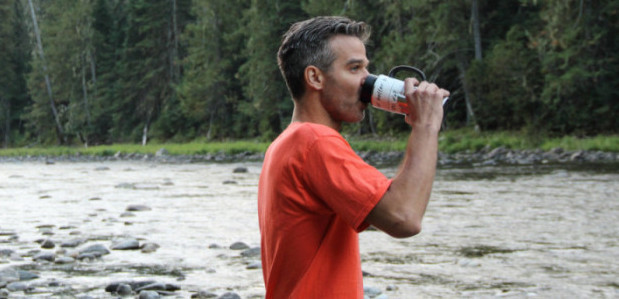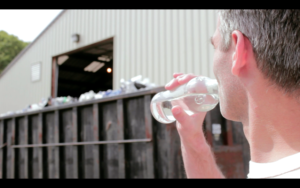
(Image: Alex Eaves)
Not too long ago, things weren’t just thrown away. Plastic wasn’t in everyday use, pre-packaged food wasn’t as prevalent, and things were used over and over. Then, beginning in the 1960’s, the use of plastic exploded and single-use versions of things started appearing everywhere: plates, napkins, bags, etc. A disposable society was born and throwing things away became the norm.
But in the 1970’s, people started recognizing that creating all of that waste was a problem. Landfill space ran out in some cities and burning the trash created pollution.
Their Solution: Recycling
In the 1980’s, recycling took off. It became commonplace in most major cities around the U.S. If you wanted to do something to ‘save the planet’, the go-to action was recycling. Special bins were created to pick up recyclables at the end of the driveway. Recycling drives were set up. It was taught in schools. And I was one of the people that it was taught to.

Alex Eaves got sick and tired of seeing all the plastic bottles that were going to waste at concert venues. (Image: Alex Eaves)
For Me, Recycling Became a No Brainer.
I recycled whenever possible. And when I toured with bands in the 2000’s, I was disgusted at the number of plastic water bottles that ended up in the trash or that most concert venues didn’t recycle. But then around 2005 or so, something changed. I realized that recycling actually wasn’t the solution to our waste problem. Not having all of that waste in the first place was the solution.
I Began Wondering, “Why Aren’t We Talking About Reusing More?”
When compared to reusing, recycling just falls short. Sure, recycling keeps stuff out of the landfills and it captures resources to be put back into the manufacturing process. But what about all of the resources used for picking the recycling up, for processing it, and turning it into something new? It seemed like a waste.
So, in 2009, I was so driven to showcase the difference between the two, that I created the slogan, “REUSE! Because You Can’t Recycle The Planet.” That slogan became a t-shirt for my reuse apparel brand, STAY VOCAL. It became my lifestyle. And it became the title of my documentary.
My REUSE! Documentary
In 2013, I successfully funded my documentary project through Kickstarter and that summer, I traveled through all 48 contiguous US states. My videographers and I sought out businesses, organizations and people who were reusing in original ways. We came across everything from skateboards made out of wine barrels in California to a community garden made with tornado debris in Mississippi.
On my journey, I found endless reuse solutions for our waste problem that are not only sustainable, but many of which are easy and fun! And I learned just how reuse truly benefits people, planet, and wallet.
Watch the REUSE! Documentary trailer
Listen, I’m not saying that I don’t recycle and that we shouldn’t recycle. After all, we can only reuse a piece of paper so many times. I’m just saying that we already have all of this stuff here in our houses, in thrift stores, in the landfills. Let’s reuse that as much as we can and avoid using resources to recycle or make new stuff. Let’s go back to that time not so long ago when things weren’t just thrown away; when things were used over and over. Doesn’t that just make sense?
Take Action to Promote Reuse
Special Offer for Visitors to WeHateToWaste.com
Get $3.00 of the digital download of the REUSE! Documentary. Just use the coupon code “wastehater16” HERE
 Host a Screening of the REUSE! Documentary
Host a Screening of the REUSE! Documentary
Any individual or organization can host a screening in a theater or community venue. Watch the “How To Host a Screening Video” on the home page at reusedocumentary.com.
Posting Guidelines
This and other stories published on WeHateToWaste.com are intended to prompt productive conversation about practical solutions for preventing waste. Opinions expressed are solely those of the contributors and WeHateToWaste implies no endorsement of the products or companies mentioned. All comments will be moderated. All postings become the property of WeHateToWaste.com.

As a young kid, I was engrained with the idea that being an environmental-conscientious meant, “reduce, reuse, recycle,” and it never occurred to me to question the popular zeitgeist. Interestingly enough, it never crossed my mind that these methods conflict with one another on some level. Super eye-opening article!
Thanks so much Liz. Sounds like we grew up similarly. It just took a few specific wasteful instances for me to really see how much more effective reuse was. Hope this makes you want to #ReuseForEarthDay!
Reusing stuff is the ultimate hack … I try my best to do that myself!
Good to hear Polly. Where do you find trouble doing it?
Wow!! Just stumbled onto you through IG post. SO COOL!!!!! Thanks!!!!
Thanks Shanna. Just curious, which post?
Thanks Alex for a great article! I am really interested in watching your documentary and will look into organising a screening at my university next fall! I was just wondering if you might have ‘5 top tips’ for reducing your waste and consumption?
Hi Lena, that’s great to hear. What school? As far as my 5 top tips, I always tell people the easiest, and most effective, reuses. These are the ones that I brought into my life first and have made a big impact on the planet and my wallet. Maybe you already do some of these.
– Shop with a reusable shopping bag
– Use a reusable mug for coffee/tea
– Bring a reusable container with silverware for meals
– Purchase pre-owned clothing
– Focus on bulk groceries, using your own jar
Op shops are overflowing with good quality everything! Glad to see so many young people moving towards reuse rather than throw away.
Thanks for the comment. And now I know that thrift stores are called Opportunity Shops in some places. Nice!
Alex, you’re totally right. I’m Italian and I was grown with the idea of reusing things: until 60 years ago, Italy was a poor country full of farmers and they used to think that throwing things away would have been insane. They reused everything, without wasting a crumb or a piece of cloth. They transmitted to the next generations their habits and, if you know the Italian cuisine, you know that often is based on scraps and leftovers. And by the way, my grandmother has been using the same pans for something like 50 years!
Can I ask you what do you think about the issue of hygiene? And what about using the Clean Technologies, instead of changing our habits?
Thanks in advance…and great article!
Hi Alessandro, I’m sorry for the delay in replying. Usually I’m way faster! As far as the issue of hygiene and reuse, this is something that comes up a lot. It really all depends on the item, but for the most part, with a proper wash and cleaning supplies, there are no hygiene issues. I personally will wear any pre-owned clothes that I wash, except undergarments, because of personal choice. That’s just a bit too “private” for me. Ha. Fortunately, I get custom made boxer shorts made from T-Shirts from korijock.com.
As for your question on using Clean Technologies, that would still be manufacturing stuff that doesn’t need to be made. Even if we’re using clean technologies to make new items, there are still many resources being used, when we could focus on reusing/repairing/repurposing what’s here first.
I hope that answers your questions and thanks for reading!
Before I even read this article, I was caught off guard by the title. I thought, “How could someone be against recycling!?” Upon second thought, I realized what the title actually meant. It really could be saying, “I am all for recycling, but we should reduce waste so that way we won’t need to recycle in the first place.” I have often thought about the waste that comes out of recycling. Recycling is okay, but reduction and reuse is even better. What we really need is to restructure the mindset of our society. People need to believe that new is not always better. Reusing items reduces waste and requires a lot of creativity. What I personally love seeing are videos tutorials on YouTube or my Facebook newsfeed of ways that people have repurposed old items into something new. I think that these videos are one way to spread the idea of reuse and inspire other people to try it.
Hi Sarah, sorry for the delay! So. my title worked! I definitely used that on purpose. My goal with the title and with all the work that I do, is to educate that recycling is really not going to save the day. There’s an easier and more effective step that was around for hundreds of years before recycling: reusing. And by reusing, you’re also reducing the need for new items and the need for more resources to be used. 2 in 1!
Since you’re into videos, I have to ask, have you watched my documentary, REUSE! Because You Can’t Recycle The Planet. ? It’s full of ideas. There’s a coupon in the article above. Also, I’m making a second film that I have a feeling you’d be interested in. I’m teaming up with a tiny house builder to convert a box truck into a mobile reuse education center and living space! Here’s that link: http://boxtruckfilm.com
Well, thank you for reading my article and I look forward to hearing what you think of my films.
– Alex
Alex your article highlights such a key point that I feel is continuously overlooked in widespread sustainability efforts. While recycling does save and reuse materials, it is still a energy- and labor-intensive process of source-separating, breaking down or compacting, and then often shipping the recyclable materials to other countries to be repurposed. However, not everything that can be recycled is recycled and ends up in the landfill anyway. We need to shift our focus on reducing our waste before we end up with waste that needs to be recycled. It’s a shame that our culture is so driven on what’s new and what’s next. Things like fast-fashion clothing contribute to unsustainable clothing production and textile waste while a new iphone or gadget is created almost every year contributing to enormous amounts of e-waste. People dispose of perfectly good items and grab the next best option without thinking twice. I’m really inspired by your article to really look at my own consumption practices, to reduce the waste I generate, and to find (re)uses for old materials that I already own. I hope to spread this consciousness and inspire those around me to do the same as well!
Hi Kathleen, thanks for reading my article and for your response. I agree that it’s a shame about what’s new and next, but hopefully people will begin to see that even that is possible with reuse. Tire of your black shirt? Put a patch on it. I’d love to see upgradeable phones too. Also, if you were inspired by this article, I really encourage you to watch my film (reusedocumentary.com). I met so many great people and it was never ending inspiration across the U.S. We really tried to capture that for the film.
Thanks again Kathleen!
Awesome work, Alex!
I have read that recycling can cost more because while people have good intentions, they do not follow the not-so-easy to follow procedures of recycling. What can be recycled? What can’t? Do I really need to scrape that container clean?
I really appreciate your mission to disrupt what has become status quo thinking – even in the relatively short time recycling has been a part of our daily lives,
Your looking at the issue through a different angle reminds me of the powerful Food, Inc. that goes beyond encouraging conservation and looks at how the system is already broken, namely the food production industry. It’s amazing how one hamburger costs us so much in resources from farmland to water, to our health, and how it’s all connected.
Congrats and can’t wait to check it out!
Hi Sarah,
Wow, I’m stuck on the fact that you put my mission and film in the same realm as Food, Inc. That’s quite the honor! Food is definitely an important topic for me too. I highly recommend watching Cowspiracy if you have not seen it yet…. after you watch my film of course. Ha.
But yes, we’ve been told for years that recycling is going to save the planet, but it’s really not working. We actually need to go back to what was happening before recycling and and before the single use revolution. Reusing isn’t new. It’s one of the oldest and most effective tricks in the book.
Thanks for your words Sarah,
Alex
It does make sense Alex. I’ve noticed many of us lack continuousness for one another. For example, by throwing away a piece of gum on the sidewalk, we put a pigeon life at risk. However, all we think about (when the gum is being thrown away) is that we don’t want it anymore. I belief we must start thinking about the aftermath of actions, and how it affects something or someone in our surroundings. Great post!
Hi Nicole,
Thanks for the comments and as an animal rights activist too, I like the pigeon example. Convenience for us isn’t convenience for all.
Have a good night.
I’m not against recycling by any means, but I agree that reusing is a far better(an sustainable) option in most cases. The amount of energy that goes into the recycling and re-manufacturing process is incredible.
Sounds like we’re on the same page Laura. Thanks for chiming in!
Very True! Reuse is a much better solution than recycling. I look forward to watching your documentary.
Thanks. Let me know what you think!
I love this notion! It makes a lot of sense, and it is definitely something we could all implement. Now that I think about it there is no need to have disposable plastic cups available at my on-campus job– I am a college student– when we already have a nice sink and cabinets for use: why not bring in mugs and glasses for water? While it’s just a small step to reducing the amount of waste that is produced at work it definitely adds up in the long-term.
Hi Kimberly, thanks for reading and comment. I love that you came up with an idea while writing your comment. Hopefully you can help inspire others on your campus to cut down their waste too! On a related note, we’re currently booking screenings for the REUSE! Documentary at campuses around the country, so maybe you’d be interested in helping set one up. Send us an email at bookings@stayvocal.com and we can send you some more details. Thanks!
This is something I always stressed in my environmental group in college. Many people always quote recycling as a cliche of environmentalism, but the real attention in terms of changing the way people use the resources of the planet is to really evaluate whether they need to use them in the first place! This is why reusing and (arguably more importantly) reducing waste is key to making that change and it is so great to see all the people out there living that message! Great job with this project, Alex!
Thanks for the comment and the kind words Jason. And reducing is definitely hugely important, which is why reusing is great. When we reuse, we reduce at the same time: new products and resources needed for to make them. High fives sir.
One tweak to bring out the Reuse campaign throughout USA would be to bring in “service” jobs. We are no longer a manufacturing industry rather a service one. And even in that service category we could make a label for “repairing” jobs and not just customer service, banking, etc. In Pakistan for example, if a shoe is torn they can easily find a “Mochi”. A mochi is a shoe repair person than can patch up any types of shoes. This is unheard of in United States and it becomes easy to throw away shoes which can be easily fixed but people lack the skills required to do so. This is just one of the examples of reusing things instead of throwing them away.
Hello Uzair,
Thanks so much for reading my article and sharing your comment. Repair is a huge component of reuse and something I get into in my film mentioned above. And you are right, it’s almost unheard of in the U.S. Fortunately, there is a “Right to Repair” bill being discussed in many states to ensure that companies make their products repairable. Here’s one example from Minnesota: https://minnesota.repair.org/ We’re definitely getting back into that mindset. Thanks again Uzair!